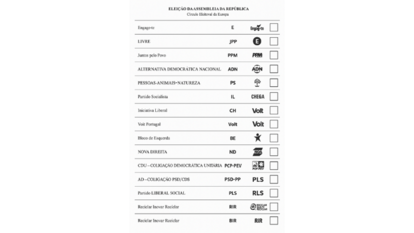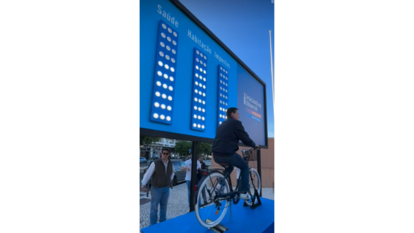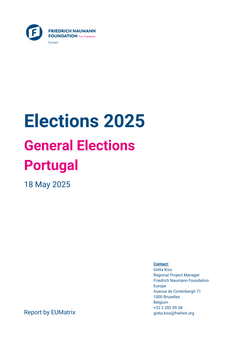Legislative Elections Portugal 2025
Portugal’s Power Shift: Right Bloc Ends Bipartisan Era

Rui Rocha, elected Member of Parliament and President of the Portuguese liberal party, Iniciativa Liberal.
© Iniciativa LiberalOn May 18, Portugal held legislative elections for a new Parliament. The center-right coalition Democratic Alliance emerged as the winner, though it fell short of securing an outright majority. One of the most striking developments was the rise of the far-right party Chega that secured the same seats as the Socialist Party. The Portuguese liberal party, Iniciativa Liberal, reinforced its position as the fourth-largest political force.
Snap Decision and Electoral Fatigue
Portugal headed into snap elections amid a climate of political uncertainty and eroding public trust in the government. The elections were called after former Prime Minister Luís Montenegro of the Partido Social Demócrata (English, Social Democratic Party, PSD- a sister party of Germany’s CDU) faced conflict-of-interest allegations linked to family businesses connected to the construction company Spinumviva. In response to two opposition-led motions of no confidence, the government tabled a motion of confidence to assert stability. However, the National Parliament rejected it—leading to the collapse of the government.
The legislative elections marked Portugal’s 11th national vote since 2020 and saw a 35% abstention rate, reflecting growing voter fatigue. At the heart of the campaign was a single pressing issue: how to form a stable and governable coalition in an increasingly fragmented political landscape.

Ballot paper for the legislative elections held on May 18.
© FNF EuropeHow has the composition in Parliament changed?
The center-right coalition Aliança Democrática (English: Democratic Alliance, AD), led by PSD, narrowly topped the polls with 32.10% of the vote, securing 86 seats. The Partido Socialista (English: Socialist Party, PS) followed with 23.38% and 58 seats.
One of the most dramatic shifts came from the far right wing party Chega (English: Enough) which matched the PS’s seat count with 58, despite receiving a slightly lower share of the vote at 22.56%. This marks a gain of 10 seats compared to the last legislative election.
Four seats remain undecided, pending the final count of diaspora votes — two from the European electoral circle and two from outside Europe. Given that the Portuguese diaspora vote has historically favored right-wing parties, Chega may secure additional seats. If confirmed, this outcome would establish Chega as the second-largest political force in Parliament and potentially the main voice of the opposition.
For the first time in Portugal’s democratic history, a regional party has entered the national Parliament. Juntos Pelo Povo (English: Together for the People, JPP), a center-left party from Madeira Island, secured representation at the national level.
Liberals Gain Ground, But Not Enough for Power
The Portuguese liberal party, Iniciativa Liberal (English: Liberal Initiative, IL) has increased its share from 5.08% to 5.53%, earning 9 seats, up from 8 in the previous legislature. While this is a modest gain, it confirms IL’s position as the fourth political force nationally. IL’s success is particularly notable in urban centers such as Lisbon, Porto, Aveiro, Braga, and Setúbal, and among younger, reform-minded voters.

Billboard campaign calling for a new direction for Portugal, encouraging voters to move beyond traditional political parties and consider IL’s reformist proposals.
© Iniciativa LiberalIL's growth is closely linked to its innovative and bold communication strategies, particularly its use of provocative billboards and street campaigns that have resonated strongly with younger voters. IL leader Rui Rocha invited voters to join him for a symbolic ride on a stationary bike, emphasizing that Portugal needs to pick up speed—particularly in key areas such as healthcare, housing reform, and tax reduction. This message was reinforced by a billboard campaign calling for a new direction for Portugal, urging voters to move beyond the country’s traditional political parties and embrace a bold, reformist alternative.
These campaigns have helped the party stand out in a crowded political landscape and connect with a demographic seeking fresh and direct messaging. Under the campaign motto “Accelerate Portugal”, the party presented a clear and ambitious program structured around three key pillars: modernizing the state, restoring trust in institutions, and breaking economic stagnation.

Street campaign featuring IL leader Rui Rocha inviting voters to join him in a symbolic ride on a stationary bike, highlighting the message that Portugal needs to pick up speed.
© Iniciativa LiberalDuring the election campaign, IL leader Rui Rocha emphasized his commitment to ensuring political stability in Portugal — a statement many interpreted as a potential openness to coalition with the center-right AD. However, the Portuguese Parliament requires an absolute majority of at least 116 out of 230 seats to govern effectively. Together, AD and IL currently hold only 95 seats, which means a coalition between the two would still fall short of a parliamentary majority.
Following the announcement of the results, Rui Rocha stated on national television that he would be available “for coalition talks in the coming days”, while emphasizing that he remains committed to defending IL’s ideas in Parliament.

Mariana Leitão, elected Member of Parliament and Iniciativa Liberal's presidential candidate for the 2026 elections.
© Iniciativa LiberalWhat’s Next for Portugal?
The Portuguese electorate has clearly steered the country toward the right, marking a significant political shift. One of the most striking developments is the dramatic rise of Chega, which surged from just 1.2% of the vote in 2019 to 22.56% in 2025. Not only does this represent a major electoral victory for Chega but also a clear defeat for the traditional leftist parties. This situation has led to the resignation of the socialist party leader, Pedro Nuno Santos.
Where did the votes for the far right come from? Surprisingly, Chega made substantial gains in regions traditionally dominated by the left, such as Setúbal. This suggests that a segment of left-leaning voters may have shifted their support to a far-right party — a striking development that points to a broader political transformation in the country’s electoral landscape. Such a shift could also mark the decline of the bipartisan system that has defined Portuguese politics since the democratic revolution of April 1974, in which power alternated primarily between the PS and PSD.
The AD coalition will need to negotiate with smaller parties to form a stable government—but its ability to do so without relying on Chega remains uncertain. Portugal's fragmented Parliament, combined with strong ideological divides among parties on the right, makes consensus-building especially difficult.
Implications for Europe’s Liberals
For German and European liberals, Portugal’s vote holds wider significance. IL’s steady rise demonstrates the growing appetite for pro-market, reform-oriented politics in Southern Europe—especially among younger, urban voters.
However, the growing strength of Chega introduces a more volatile element into Portuguese politics. Any move by mainstream parties to engage with populist forces risks undermining liberal democratic norms and fracturing pro-European consensus.
Odilia Abreu is a policy analyst specializing in migration, political diaspora, and liberal thought in Southern Europe. Her work focuses on the intersection of mobility, democratic governance, and regional integration, with particular attention to how diasporic communities influence electoral politics and policymaking across the EU. Odilia Abreu currently works as a freelance expert, advising organizations including the Friedrich Naumann Foundation for Freedom (FNF) Europe in Brussels, where she provides analyses on political developments in Spain, Portugal, and Italy.

